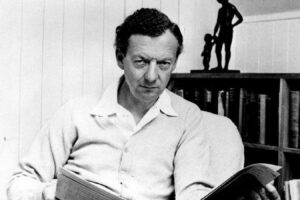

In a pre-performance talk, Gordon called Morning Star an “operacal” which I took to mean opéra comique. The source material is Sylvia Regan’s 1940 play that follows a Jewish immigrant family on the Lower East Side from 1910 through the Great Depression. Molly Picon, the doyenne of the Yiddish theater, starred as the widowed matriarch Becky Felderman and sixteen-year-old Sidney Lumet portrayed her grandson.
The pivotal event in the play and the opera is the 1911 Triangle Shirtwaist Factory fire that killed 146 workers, mostly young immigrant women, when locked doors and crumbling fire escapes prevented their escape. Imagery of the Triangle is used effectively throughout the opera, so that the factory is a presence and always in the background. But an effective set doesn’t make up for male characters lacking definition and motivation (and there are four of them).
Morning Star begins with nine singers holding large black umbrellas and, as the projections make clear, they are part of the crowds assembled for the public viewing of the victims in their coffins. Gordon’s music is appropriately somber and builds to an anguished chorus of women mourning the dead.
If only the rest of the opera had this emotional heft, it would be a solid success. The biggest difficulties are Hoffman’s libretto and the dramatic continuity. For whatever reason, Hoffman wrote much of the text in couplets that were cringe-worthy. One grating example rhymed “latkes” with “hot kiss”. Nonetheless, there were moments of genuine poetry and lovely imagery, just not enough of them.
But Hoffman gets it right with the opera’s title song, a Tin Pan Alley ballad sung by the character Irving Tashman, an aspiring Broadway composer in love with Fanny Felderman. Hoffman crafted a spot-on lyric and Gordon’s music is fresh out of 1910.
Continuity was another problem; scenes felt more episodic than part of a linked scenario. Immediately after Esther Feldman and her friend Mary lament their pregnancies (neither is married yet), there’s an upbeat Gershwinesque number about babies being kosher. It’s a brilliant, concise explanation of everything you’d want to know about what’s kosher, and then it moves into the next scene with no transition. Was it meant to provide comic relief? It came off as more of a throwaway chorus number and the comedy lacked any irony, that hallmark of Jewish humor.
The male characters would have benefitted from greater depth. Aaron Greenspan, a boarder in the Felderman apartment, is in love with Becky. I guess he’s supposed to be a socialist—he sings a snatch of the “Internationale” at the beginning of the opera, and in the second act, he’s on the side of the union in the factory he runs with Esther’s anti-union daughter Sadie. But there’s not much more to him than that. Harry Engel and Irving are little more than ciphers, and there’s an African American couple, Prince and Pearl, with no backstory at all. Despite the fact that Pearl had the showstopping aria, there’s no sense of who she is nor of her relationship with Prince.
Gordon is one of the most successful composers today, with eleven operas to his credit and scores of songs that are on recital programs in concert halls and conservatories. Overall, the score is richly melodic, frequently haunting and poignant. He sets text with great sensitivity for words and voice, particularly for women’s voices. His best writing was for the prologue and the final ensemble, in which two of the characters die in the Triangle fire. But even that scene felt too long; judicious cutting might have enhanced the emotional surge.
Gordon’s music is probably the force that drew an outstanding cast of young singers, all Americans. The women not only get the best characters, they get the best music. The sopranos are all wonderful: Twyla Robinson, Jennifer Zetlan, Elizabeth Zharoff and Elizabeth Pojanowski, who sings sister Sadie with steely determination. Jeanine De Bique garnered the evening’s biggest ovation. Her lustrous soprano has an exquisite purity that took my breath away. Andrew Bidlack, Andrew Lovato and Larry D. Hylton turned in fine performances; Morgan Smith is a singer who deserves a part bigger than Aaron’s but hearing him live is always a pleasure and this occasion was no exception.
As good as the vocal performances were, I had difficulty hearing the dialogue, much of it important plot points. The School for the Creative and Performing Arts’ Corbett Theater is a 750-seat house, and I hope that the singers will do a better job projecting their spoken lines over the run.
The Triangle building is indeed a presence, projected on an upstage triangular screen. The action plays out with only a few props and Ron Daniels’ staging is understated, allowing the music to propel the story. He wisely restrained the singers from affecting Yiddish accents. If Aaron’s Yiddish love song sounded more German, well, maybe he’s from the Rhineland, even if it says Riga in the program.
The effective projections were designed by Wendall K. Harrington in collaboration with scenic designer Riccardo Hernandez.
It was a big night for Cincinnati Opera, which is to be commended for being a partner in the Opera Fusion project, along with UC’s College-Conservatory of Music. Composers John Corigliano and Mark Adamo were in the audience, along with soprano Carol Vaness.
So the question is, does Morning Star have legs? I think so, especially in a conservatory setting. Gordon has revised some of his earlier works, and I hope he revisits this one. Morning Star has the potential to be a truly powerful work reflecting a tragic turning point in American history.


























Comments